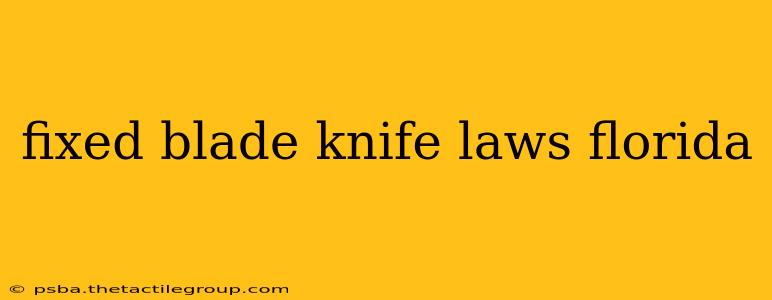Florida's knife laws can be confusing, especially when it comes to fixed blade knives. This comprehensive guide clarifies the legal landscape surrounding the ownership, carrying, and use of fixed blade knives in the Sunshine State. Understanding these laws is crucial to avoid legal trouble. This information is for educational purposes and should not be considered legal advice. Always consult with a legal professional for specific guidance.
What are Fixed Blade Knives?
Before delving into the specifics of Florida law, let's define the term. A fixed blade knife is a knife with a blade that is permanently attached to the handle. This contrasts with folding knives, where the blade folds into the handle. The length of the blade is a key factor in determining legality.
Florida Statutes Regarding Fixed Blade Knives
Florida Statute 790.01 defines prohibited weapons. While it doesn't explicitly list "fixed blade knives" as a blanket prohibited weapon, the legality hinges on several factors, primarily the blade length and the context of possession and use.
Blade Length: The Crucial Factor
The length of the blade is the most significant determinant of legality. While there isn't a specific prohibition on fixed blades under a certain length, carrying a knife with a blade exceeding certain lengths in certain situations can lead to legal issues. The ambiguity often arises in interpretations of "concealed weapon" laws.
Concealed Carry of Fixed Blade Knives
The core issue often centers around the concealed carry of fixed blades. Florida law generally prohibits the concealed carrying of any weapon, including knives, that could be considered dangerous weapons. This is particularly true for blades that exceed a certain length (the precise length isn't explicitly stated, making judicial interpretation crucial). Open carrying a fixed blade is generally more permissible, but even this has nuances depending on location and circumstances.
Specific Locations and Restrictions
Carrying any knife, regardless of blade length, is often restricted in specific locations, such as:
- Schools: Possession of knives on school property is generally prohibited, with few exceptions.
- Government buildings: Similar restrictions often apply to government buildings and courthouses.
- Bars and nightclubs: Many establishments prohibit knives, regardless of size, for safety reasons. This isn't a state law, but rather an establishment's policy.
It's crucial to be mindful of the specific rules of the location where you're carrying a fixed blade knife.
Exceptions and Legal Uses
There are some exceptions to these general rules. For instance, certain occupations may require carrying a fixed blade knife as part of their work (e.g., hunters, construction workers, chefs). These individuals typically have a legitimate need to possess the knife for their occupation.
Furthermore, the intent behind carrying the knife plays a role in legal considerations. If the knife is carried for self-defense or with the intent to commit a crime, this can significantly impact the legal implications.
Understanding the "Intent" Clause
The "intent" behind carrying a knife is a critical aspect that law enforcement will consider. Were you carrying it for lawful purposes (hunting, work, etc.) or for an unlawful purpose (assault, etc.)? This is often difficult to prove, underscoring the importance of being able to demonstrate a lawful reason for carrying a fixed blade.
Navigating the Gray Areas
The lack of explicit length limitations for fixed blade knives in Florida law creates many gray areas. It's always best to err on the side of caution. If you're unsure about the legality of carrying a particular knife in a specific location, it's advisable not to carry it. Consult with a legal professional if you have any doubts.
Disclaimer:
This information is for educational purposes only and should not be considered legal advice. Florida knife laws are complex and subject to interpretation. Consult with a qualified legal professional in Florida for advice tailored to your specific circumstances.

